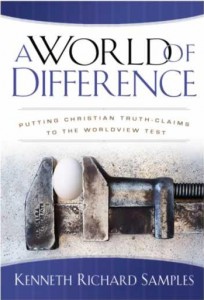 You're probably familiar with the encounter between Pilate and Jesus that ends with Pilate asking, "What is truth?" (John 18:38).
You're probably familiar with the encounter between Pilate and Jesus that ends with Pilate asking, "What is truth?" (John 18:38).
Although we don't know the tone in his voice when he asked the question, we do know that he didn't seem to linger for an answer (the passage continues, "After he had said this, he went back outside").
The truth question remains relevant to this day, but how do we know what's true? When we ask the question it's already charged with ideas. "How do we know" falls under the branch of philosophy known as epistemology, which addresses all sorts of questions about knowledge.
We might then ask, what is knowledge? Those who have studied the subject may quickly answer, knowledge is justified true belief. We don't have time or space here to offer an introductory course in epistemology, but we can offer some ideas for approaching the truth question.
If truth is what corresponds to reality, then it is to our benefit to understand ways of determining what actually does correspond to reality (what is true). When it comes to worldviews, for instance, there are many conflicting approaches to how people explain and interpret the world.
I'm reminded of a great quote in the C.S. Lewis novel That Hideous Strength. One character makes the remark, "I suppose there are two views about everything." A fellow named Hingest replies, "Eh? Two views? There are a dozen views about everything, until you know the answer. Then there's never more than one."
So how can we put ideas and claims about reality to the test? There are many methods we can employ, but I'll share just two here. (Those who wish to pursue further study of worldview tests can see chapter 2 of A World of Difference by Kenneth Samples and chapter 3 of Christian Apologetics by Douglas Groothuis.)
The coherence test asks whether or not a worldview is logically consistent. As Samples writes, "Truth will always be wholly consistent within itself, displaying internal logical harmony. The coherence test stresses the crucial unity and relatedness of all truth. Therefore any logical inconsistency in the basic elements of a worldview is a mark of essential error."
The coherence test, however, on its own is not enough to determine whether or not a worldview is wholly true. It may be internally consistent, but externally inconsistent with known facts of science, history, etc.
Another helpful test is the explanatory power and scope test. As Samples puts it, this test asks, "How well does a worldview explain the facts of reality ('power') and how wide is the range of the explanation ('scope')?" Any worldview contending for its position as the true worldview should explain reality in a manner that is convincing, broad in scope, profound, and viable.
How does all this relate to home education? Sonlight strives to present and explore various perspectives and viewpoints. We're not known for avoiding controversial issues or dogmatically indoctrinating children. Instead, we want to help parents raise children who think critically and are able to sift through various ideas and come to conclusions that offer the best explanation of reality.
What do you do to help your children know what's true?
Robert Velarde
Author/Educator/Philosopher






